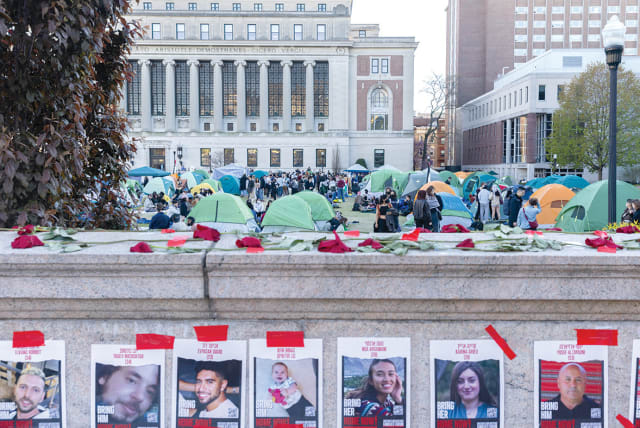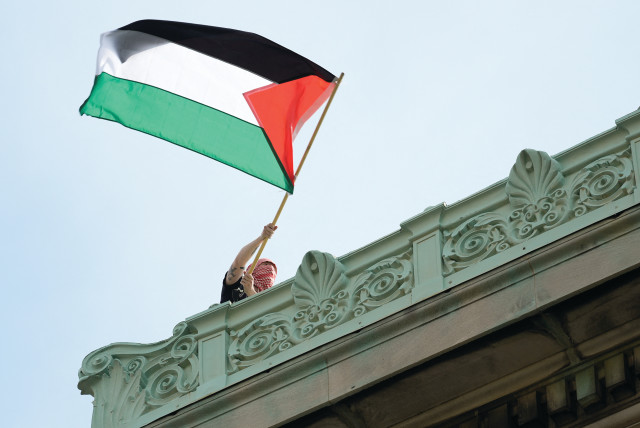300 Jewish Columbia students decry campus antisemitism in anti-Israel cloak

The letter argued that Jewish self-determination in their historic homeland was an integral part of Jewish identity.
An open letter signed by over 300 Jewish Columbia University and Barnard College students decrying antisemitism in the guise of anti-Zionism on campus was issued on Wednesday during the weeks of protests, encampments, and building occupations.
The students said that many had spoken in their name, including “well-meaning” alumni and Israel supporters; exploitive American culture warriors, and anti-Zionist Jews who misrepresent Jewish values to “tokenize themselves” in an “attempt to delegitimize our lived experiences of antisemitism.”
“We would like to speak in our name,” said the students. “Most of us did not choose to be political activists. We do not bang on drums and chant catchy slogans. We are average students, just trying to make it through finals much like the rest of you. Those who demonize us under the cloak of anti-Zionism forced us into our activism and forced us to publicly defend our Jewish identities.”
The letter argued that Jewish self-determination in their historic homeland was an integral part of Jewish identity.
“Judaism cannot be separated from Israel. Zionism is, simply put, the manifestation of that belief,” the students contended, dismissing the idea to the contrary. “We connect to Israel not only as our ancestral homeland but as the only place in the modern world where Jews can safely take ownership of their own destiny. Our experiences at Columbia in the last six months are a poignant reminder of just that.”
The letter listed instances of aggressive and dehumanizing rhetoric leveled at the Jewish students not just since the April 17 encampment that was expelled last Wednesday, but in response to Hamas’s October 7 Massacre. The students said that there were protests against Israel “while our friends’ and families’ dead bodies were still warm.”
Pro-Hamas sentiment on Columbia campus
Pro-October 7 sentiment was expressed when on April 20 a student held a sign next to pro-Israel students declaring them to be “[Izz ad-Din] Al-Qassam [Brigades]’s next targets.” The students said it was unsurprising that Columbia University Apartheid Divest leader Khymani James told Columbia administrators in a January meeting that “Zionists don’t deserve to live,” and “Be grateful that I’m not just going out and murdering Zionists.”
Much of the antisemitism encountered by the students was an inversion of the “Holocaust legacy,” said the students. They recalled an October Black Lesbian student film event which barred Zionists because “white Jewish people” have always “been the oppressors of all brown people” and dismissed the Holocaust as not “special.” Students leaving the campus on April 20 were heckled with calls of “go back to Poland,” where “our relatives lie in mass graves.”
The situation became so tense with the establishment of the tent settlement aimed at forcing the administration to adopt anti-Israel policies, that Orthodox Union Jewish Learning Initiative on Campus director rabbi Elie Buechler warned Jewish students to leave campus for the Passover holiday.
The students argued that in the same way that Jews had been scapegoated historically and globally for supposed societal evils, be it for capitalism, communism, or not being European enough, now they were being cast as “colonizers and oppressors.”
“We are targeted by those who misuse the word Zionist as a sanitized slur for Jew, synonymous with racist, oppressive, or genocidal. We know all too well that antisemitism is shapeshifting,” said the students. “If the last six months on campus have taught us anything, it is that a large and vocal population of the Columbia community does not understand the meaning of Zionism, and subsequently does not understand the essence of the Jewish People.
Yet despite the fact that we have been calling out the antisemitism we’ve been experiencing for months, our concerns have been brushed off and invalidated.”
The students said that they would not forget the students and faculty who prevented Jews from entering parts of the campus, or those who chose to be silent.
“While campus may be riddled with hateful rhetoric and simplistic binaries now, it is never too late to start repairing the fractures and begin developing meaningful relationships across political and religious divides. Our tradition tells us, ‘Love peace and pursue peace,’ said the students. “We hope you will join us in earnestly pursuing peace, truth, and empathy. Together we can repair our campus.”
Jerusalem Post Store
`; document.getElementById("linkPremium").innerHTML = cont; var divWithLink = document.getElementById("premium-link"); if (divWithLink !== null && divWithLink !== 'undefined') { divWithLink.style.border = "solid 1px #cb0f3e"; divWithLink.style.textAlign = "center"; divWithLink.style.marginBottom = "15px"; divWithLink.style.marginTop = "15px"; divWithLink.style.width = "100%"; divWithLink.style.backgroundColor = "#122952"; divWithLink.style.color = "#ffffff"; divWithLink.style.lineHeight = "1.5"; } } (function (v, i) { });

